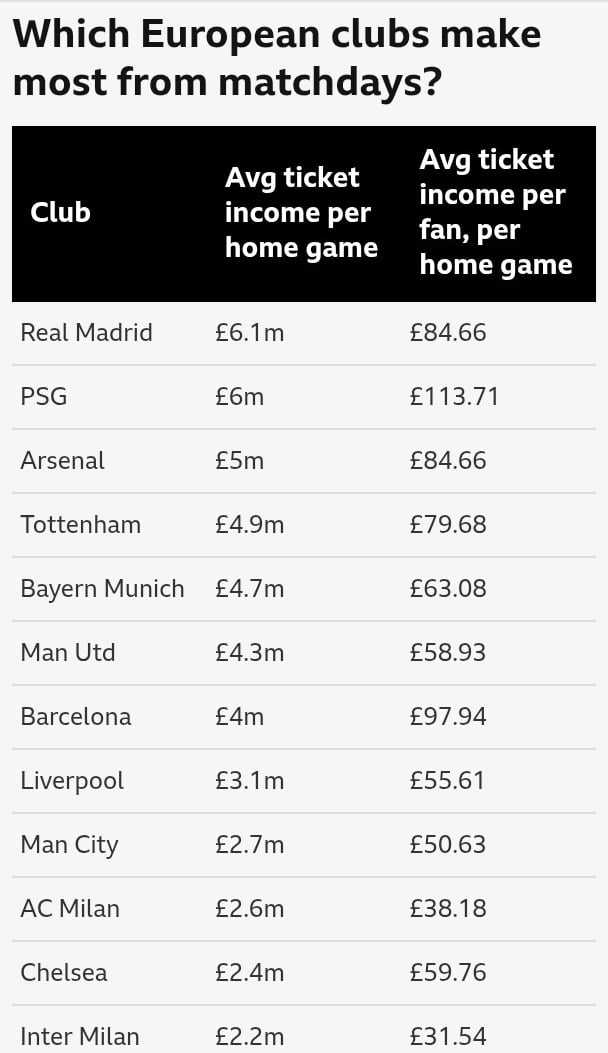Premier League Ticket Sales & Price Hikes 2024-25
In 2024, Premier League clubs generated over £830 million from ticket sales, but rising prices have sparked fan protests. Discover which clubs earn the most and the reasons behind the continuous price hikes.
3/7/20254 min read


Premier League Ticket Prices: Are Clubs Exploiting Fan Loyalty?
Introduction: A Growing Concern for Football Fans ⚽
The rising cost of Premier League tickets has sparked widespread outrage among fans, with protests erupting across various stadiums. Supporters argue that clubs are prioritizing profits over loyalty, making it increasingly difficult for average fans to attend matches.
In the 2024-25 season, 19 out of 20 Premier League clubs raised their ticket prices, leading the Football Supporters' Association (FSA) to launch the "Stop Exploiting Loyalty" campaign. The issue has gained further traction as some clubs have removed concessionary discounts for seniors, young fans, and disabled supporters, making the beautiful game less accessible.
But how much do Premier League clubs actually earn from ticket sales? And why are prices increasing despite record revenues? Let's break down the financial realities behind ticket pricing and whether clubs truly need to charge more.
How Much Do Premier League Clubs Make from Ticket Sales? 💰
According to UEFA's European Club Finance and Investment Landscape Report, Premier League clubs collectively earned a staggering €1 billion (£830 million) from ticket sales in 2023. This marks a 10% annual growth rate, nearly double the ticket revenue of Spain’s La Liga (€581 million/£481 million) and Germany’s Bundesliga (€520 million/£430 million).
Top Premier League Clubs by Gate Revenue (2024) 🏟️
Six English clubs ranked among the top 10 clubs in Europe for gate receipts in 2024:
Manchester United 🏆
Liverpool 🔴
Arsenal 🔥
Manchester City 💙
Chelsea 💰
Tottenham Hotspur 🏟️
The report highlights that Premier League clubs generate a per-fan ticket revenue of £29-£37, significantly higher than most European leagues. This statistic underscores how ticket prices in England have surged beyond inflation, fueling fan protests and discontent.
Why Are Ticket Prices Increasing? 📈
Clubs argue that ticket hikes are necessary due to:
Rising operational costs (electricity, stadium maintenance, staffing)
Strict financial regulations (Profit & Sustainability Rules - PSR)
Increasing player wages and transfer spending
However, football finance experts disagree. Dan Plumley, a senior lecturer at Sheffield Hallam University, states:
"Raising ticket prices doesn't significantly impact a club's overall financial picture. The reality is, Premier League clubs are already making record revenues through TV deals, sponsorships, and hospitality sales."
Key Statistics on Premier League Finances (2023-24) 💷
Premier League clubs earned £6.2 billion in revenue (2023) – more than any other European league
Despite record income, English clubs reported a combined loss of £728 million before tax
TV rights deals are plateauing, forcing clubs to find new revenue streams
Matchday revenue now accounts for only 13% of total income, yet ticket prices continue to rise
The Hospitality Boom: Pricing Out Regular Fans 🍷
One of the key drivers of ticket inflation is the shift towards premium hospitality seating. Clubs like Arsenal, Tottenham, Manchester City, and Liverpool have heavily invested in high-end matchday experiences, prioritizing corporate clients over ordinary fans.
💬 “We have seen a massive shift towards hospitality-focused stadium expansions. While it makes financial sense, it is pushing out traditional supporters who can’t afford the steep prices,” says Plumley.
For example:
Tottenham Hotspur Stadium generates record revenue from luxury suites and premium seating
Arsenal’s Emirates Stadium charges over £3,000 for some season ticket packages
Liverpool and Manchester City have doubled their matchday revenue since 2009 by expanding premium seating options
The consequence? Long-time fans are being priced out, leading to protests at several clubs, including Manchester United, West Ham, and Arsenal.
Premier League Spending: Where Does the Money Go? 💸
Despite ticket price hikes, Premier League clubs are struggling financially due to massive expenditures.
Eye-Watering Spending Figures (2023-24) 🔥
Premier League clubs spent £4 billion on player wages in 2023 – nearly double that of La Liga (£2.1 billion)
Chelsea has the most expensive squad in history, spending €1.7 billion (£1.4 billion) in transfers over five years
Four English clubs have squads costing over €1 billion:
Chelsea (€1.7bn) 🏆
Manchester City (€1.3bn) ⚽
Manchester United (€1.1bn) 🔴
Arsenal (€1bn) 🔥
Three of the five least profitable clubs in 2024 were English:
Chelsea (-£93m) ❌
Aston Villa (-£84m) ❌
Liverpool (-£55m) ❌
The contradiction? Clubs are spending beyond their means, yet expect fans to pay more to cover costs.
The Staffing Explosion: Do Clubs Really Need More Employees? 👨💼
Beyond player wages, non-football staff salaries have surged as clubs expand their commercial and marketing departments.
📊 Key Staffing Statistics (2024)
Premier League clubs employ 11,081 full-time staff members
Manchester United plans to cut 450 jobs, nearly 39% of its workforce, citing profitability concerns
Barcelona has the most employees in Europe (1,781)
Four Premier League clubs employ over 1,000 full-time staff:
Manchester United
Brighton
Liverpool
Manchester City
English clubs spent £1 billion on non-player wages in 2023, more than twice that of Germany
🚀 "Football clubs today employ more staff than ever before, particularly in commercial and sponsorship roles," says Plumley.
While staffing expansion is essential for growth, it raises questions about efficiency and sustainability.
Fan Protests: Will Clubs Listen? 📢
Fan backlash against rising ticket prices is at an all-time high, with supporters demanding a Premier League-wide ticket cap.
Recent Fan Protests Against Ticket Prices
Manchester United vs. Fulham (FA Cup, 2025): Fans held banners reading "Stop Exploiting Loyalty"
West Ham United: Supporters protested outside London Stadium over removal of concessionary tickets
Arsenal (2025-26 season): Fans furious over another price increase despite record revenues
💬 "Clubs claim financial fair play forces them to raise prices, but fans aren’t buying it. We need accountability," says Duncan Drasdo, CEO of the Manchester United Supporters' Trust.
Conclusion: A Call for Fair Ticket Pricing ⚖️
While clubs face legitimate financial pressures, the burden should not fall solely on loyal fans. With record revenues from broadcasting, sponsorships, and commercial deals, Premier League teams can afford to keep ticket prices fair.
✅ Possible Solutions:
Introduce a Premier League-wide ticket cap
Allocate more affordable seating options for young, elderly, and disabled fans
Redirect profits from hospitality sales towards general admission affordability
Football should remain a game for the people—not just the wealthy elite. As fan protests continue, the pressure is mounting on clubs to make Premier League tickets more accessible.
🔥 What do you think? Are ticket prices too high? Let us know in the comments!
